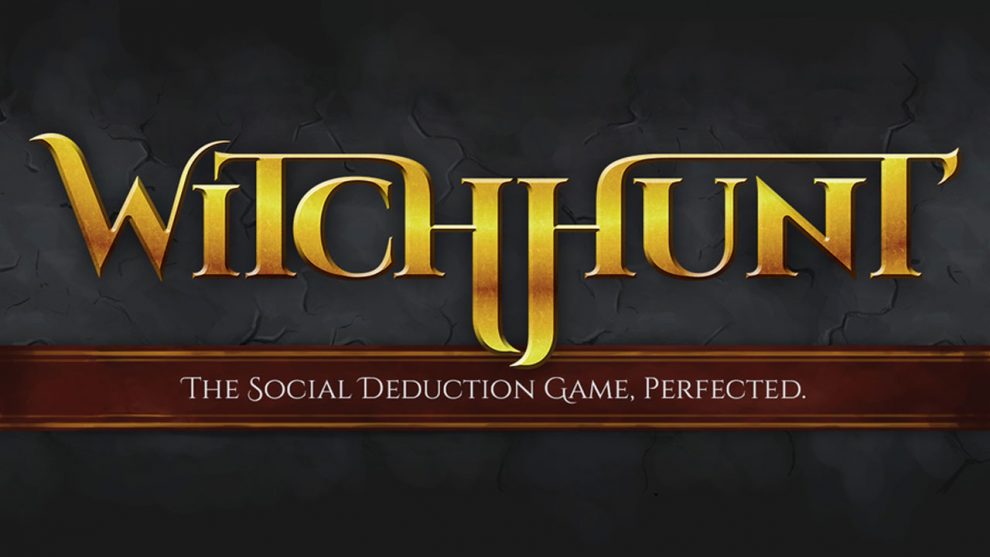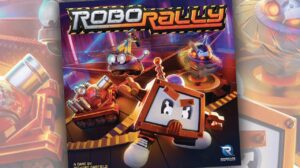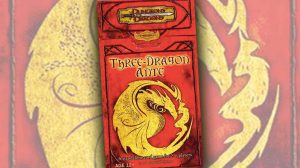One of the funny things about the board game industry is other creators trying to sell their products as the next evolution to whatever popular game is out there. It’s cliche but sometimes it works. In Witch Hunt’s case, the claim here is an evolutionary step from ye old Werewolf. This is an understandable position to take; Werewolf is a social deduction game that has been around for decades and its success had a butterfly effect on modern tabletop gaming. The difference here is many modern social deduction games try to shy away from Werewolf’s roots while Witch Hunt embraces it. It still plays on the power fantasy of mob mentality that drives the game forward, but is that enough to save this village?
Werewolf. That word can cause several reactions from joy to disgust. For the uninitiated, Werewolf is a social deduction game where you have a team of Villagers and Werewolves. The catch is the Werewolves are the minority of players but know who is on their team, while the Villagers are the majority but know nothing. It is a continuous war between the informed few vs the uninformed many. Each “night” the Werewolves will eat one of the Villagers, thus removing them from the game. Each “day” the Villagers discuss and vote to execute one of the players. This cycle continues until one side wins. There are numerous variations to the Werewolf formula from small house rules to giving players special powers such as the Village Seer who is able to figure out the team of the targeted player during the Night phases.
Sharpening The Claws
Witch Hunt separates itself from Werewolf on numerous fronts. It still maintains the execution voting, night phases, day phases, and powers. Those powers I have mentioned in Werewolf are associated with a team. This isn’t the case in Witch Hunt, meaning that Survivalist power which allows the player to survive two murder attempts before dying? That player could be a Villager or a Witch.
This change exiles the normal conventions of Werewolf. In Werewolf, the game was static with the only dynamic elements being the players’ personalities. Witch Hunt makes it harder for both teams because they are not sure what tools are in their favor. The Villagers have to figure out the powers of their allies, while the Witches have to collaborate their randomly given powers without communicating a single word to one another.

While the concept of powers not associated with teams is interesting, the powers themselves are insanely potent. To give a few examples, the Judge is able to execute anyone in secret if there was no one killed during the day. Gravedigger looks at the bodies of those killed during the day learning both their identity as well as what team they are on since dead players do not reveal their roles. At the start of the game, the Apprentice can follow either the Judge or Gravedigger, thus learning who they are, and will take over their role if the person followed ends up in the afterlife. There is an ecosystem at work here and one of the challenges of Witch Hunt is figuring the relationships and patterns of the players on the table.
Proactive Death
Speaking of the afterlife, Witch Hunt’s way of handling dead players is an interesting affair. If a Villager or Witch player dies, they go into the afterlife either as an Angel or Demon. They are now silent participants and their choices can have a subtle but major impact. In each Night phase, the Angels will pick a single player to protect from a single kill attempt. The Demons will Hex two targets each night. If they hex a protected player, the player is still protected for the night but they can never be protected for the rest of the game. Hexing also a secondary feature: It reverses the Priest’s checks.
The Priest is a special character power who will always be a Villager. When they check a player, the moderator will tell them if the player is a Witch or a Villager. If the target was hexed though, they get the result of the other hexed player instead. Let’s say both Josh and Mary were hexed with Josh being a Villager and Mary being a Witch. If the Priest checks Mary, the moderator will say Mary is a Villager and vice versa for Josh. Mechanically, this is a very solid idea and this simple act of Angels and Demons screwing around with the living players can have very surprising results. This does come at a price and it demonstrates the core issues of Witch Hunt.
People play social deduction games because it involves the players trying to figure out patterns and resolve a puzzle together as a group. Even a player who is part of the “bad team” requires understanding their peers and slithering through the social cues to poison the discussion watering hole. From a mechanical standpoint, the idea of the afterlife players impacting the living players in a separate game is interesting but it diverts the players’ expectations in a negative way. They came into the game to talk about the puzzle, instead, they are put in a silent box. It is like watching the first 30 minutes of a movie then turning the TV off and experiencing the rest of the film using only headphones.

To further trudge through this negative bumpy road, the numerous character powers make it a test of mental fortitude for both the moderator and the players. The issue is the lack of consistency with all the powers. You need to remember there are no powerless “villager” roles in Witch Hunt, so a 12 player game will have 12 different powers the moderator needs to remember and players to deduce. It isn’t uncommon for the moderator, or even the players, to completely forget their own abilities due to some of the powers triggering at very particular times. Some only trigger when a player dies or if a player survives a kill. There are even some powers that offer protection, extra health, or get health when checked by a priest which means the moderator has to keep track of all of these things.
Not All Is Lost
I’ll give Witch Hunt a break in a few areas though. Besides the poker-sized powers and team cards, the game does offer tarot sized cards to put on the middle of the table as a reminder of the character roles and to have something tangible on the table to discuss. There is also a reasonably sized FAQ and clarifications at the back of the rule book for those awkward edge cases that will likely prop up. The moderator can also use an online web app for Witch Hunt which makes it far easier to track all these powers flying everywhere.
Some of you are probably pointing out that many of my complaints are based on human error and not the mechanisms of the game. That’s true but this is a genre is driven by the human element and if it’s challenging for the players to play faithfully due to the complexity of the system, that’s the fault of the system itself. Let’s play devil’s advocate and assume the stars are aligned with the moderator never skipping a beat, the players are able to understand their powers and everyone is armed with military discipline. How is the game? Good. Damn good.
Once you start understanding the subtle details and how the relationships of the powers work together, you’ll see how well-tested this game is. Even after dozens of plays, there wasn’t a situation that I felt one character or combination of characters were far too powerful or weak. It is a game that rewards you for abusing the tools available to you. I’ve been a Village Survivalist who pretended to be a Priest so our own Priest would have more time to investigate the players. In another game, I framed another player by having my own Witch teammates kill me and I become a Demon to make sure the Priest is spreading unwilling lies to the living players.
At its prime, Witch Hunt is a fantastic game designed for an advanced audience willing to go through the muck. Much like an F1 race car, this game is engineered so tightly that any misalignment will cause it to go off the track and cause a nasty crash. I wish the good moments of Witch Hunt were more consistent instead of flashes of coincidence. If your group has the patience to go through the challenges of Witch Hunt and don’t mind a botched session or three, it might be worth checking out.











Add Comment